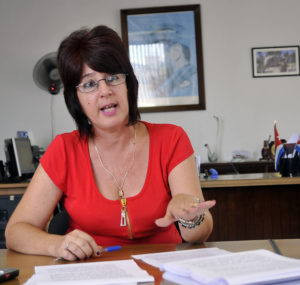 Photo by Carlos Ernesto Escalona Martí/Kako
Photo by Carlos Ernesto Escalona Martí/Kako
Cuba’s new private sector regulations
HAVANA – After almost a year of uncertainty, when new licenses allowing 27 jobs performed by the private sector were temporarily stopped in order to “perfect work done by the self-employed,” Cuban authorities finally published the updated work laws in its Official Gazette. The new regulations will take effect starting on December 7 of this year.
There are 20 new rules (5 Decrees-Laws, 1 Decree and 14 Resolutions). These involve the Councils of States and Ministers, as well as the departments (known as Ministries) of Labor and Social Security, Finance and Prices, Economy and Planning, Public Health, Industries, Transport and the Institute of Physical Planning.
The set of Decrees-Laws, Decrees and Resolutions implies adjustments to the licenses for the permitted activities, the requirements, the tax obligations and the control mechanisms expressed in contraventions and their respective sanctions. These documents cover, as befits so many rules, numerous issues that concern the private sector, with notable restrictions for some activities and some contradictions in what is regulated by different ministries.
Currently Self-Employed Workers (TCP), as they call entrepreneurs on the Island, owners and private sector employees, constitute 13 percent (591,456 persons) of the country’s active labor force.
As recognized by the authorities of the Ministry of Labor and Social Security (MTSS) during a press conference before the publication of the rules, this modality of economic management “has facilitated the process of labor reorganization initiated in 2009 in Cuba,” and has contributed to the creation of jobs (434,000 since 2010) gradually liberating the state from “non-fundamental activities.” In addition, it has helped to increase the supply and quality of some goods and services, especially those destined for tourism. Also, through the taxes collected, it has expanded and strengthened the sources of income for local and community development.
“While there have been benefits,” points out the Cubadebate website, “there have been deviations that the new policy seeks to correct.” By this statement the Cuban authorities were fundamentally referring to taxes that have not been collected.
But these deficiencies have been around since August 2017: “raw materials are used, as well as equipment and other materials procured illicitly; non-compliance with tax obligations persist and the under-declaration of income; a lack of timely dealing with problems and solutions; a lack of control; deficiencies in contracting of services, or the offer of goods, between legal entities and citizens.”
The new rules, as explained by Cuban authorities this week, are designed to correct these “deviations.” However, they also insisted that it deals with the effort to avoid the concentration of wealth and property.
The debate about what this concentration means in Cuba, the limits that should or should not be established, and the inequalities generated by a distribution of deficient riches and fatalism in access to opportunities, is still pending for Cuban society.

About the licenses
The new regulations will take effect on December 7, 2018, and at the time the 27 activities that have been frozen for almost a year will once agains be granted licenses to operate.
All self-employed workers in Cuba come under the jurisdiction of the rules since 98.4 percent of these are included in the activities that arise or are integrated among them. The rest, which comprise 9,657 workers, “should consider their new options” for which they have 150 days between the publication of the rules and their implementation. Both persons in charge of implementation of the new standards, and those employed in the private sector, will have available training and guidance from the corresponding entity in those five months, the authorities informed the press.
According to the Deputy Minister of the MTSS, Marta Elena Feitó Cabrera, “No activity has been removed, 96 of the existing ones have been grouped into 28, and out of a total that once were 201, we are left with 123.” Another point emphasized was that the new rules will not allow new licenses in the following activities, a point announced since August of last year, when they suspended issuance of licenses:
- Wholesalers of agricultural products
- Retailers of agricultural products
- Mobile vendors of agricultural products
- Record salespersons and buyers
- Recreation equipment operators (for rustic equipment)
The five activities do not disappear, technically. Those who already possess licenses for these activities will be grandfathered in and can continue to use them.
Food and beverage service permits will also be modified, giving way to the legal existence of bars and recreation centers, previously covered by the license used by gastronomic services in restaurants and cafeterias. However, the same person can not manage both a restaurant with a bar or cafeteria. You must choose one of the three licenses available.
In general, the TCP can now hire artistic, audiovisual, recorded or live services, provided they make the corresponding contract. In particular for the owners of bars and other recreational spaces, this step legalizes (and controls) the hiring of musicians and other artists who, for the most part, currently perform without declaring profits. At the same time, it forces artists to operate under the umbrella of state agency representatives as intermediaries, infamous for their inefficiency and the high percentages they charge for poor management.
The new legal regulations limit the granting of only one license per person. Regarding this point, Feitó explained that these are activities that “by their nature can not be exercised in the same time frame and are not related; there is no possibility of integrating them into the same license.” She added: “There are workers who have a cafeteria and at the same time have a manicurist license, or one for a carwash, or seller of footwear. That is impossible. In practice, he or she is the owner of many businesses. That is not the essence and spirit of self-employment, which consists of workers exercising their daily activities.”
The opportunity to lease houses, rooms and other living spaces is widened to include offering this service to legal entities (ie., companies, organizations, etc.), as well as persons.
Vice Minister Feitó also explained that in response to a TCP request, they have granted owners permission to temporarily stop working while under the license. The business owner may then name a legal representative among his or her employees to carry out the job of the owner. This stipulation can also be applied to those repairing vehicles (or related activities), for those repairing or remodeling real estate, or those who labor as lay judges.
Other points
Another new rule is the allowance and use of the Council of the Provincial Administration (CAP), a separate structure from that of local governments, and a quietly used experiment in Artemisa and Mayabeque since 2012. Because of results garnered, the National Assembly of People’s Power last month approved their use in the rest of the national territory.
The CAPs, now with more defined functions, will be the body in charge of authorizing licenses for gastronomic services and restaurants, bar and recreational services, and landlords. They may also set price and rate limits on products and services provided that the institution decides it is appropriate, and according to the characteristics of the province. On the other hand, they will preside over the multidisciplinary group conceived in the new regulations that evaluates the feasibility of developing new activities in areas where they could disturb the community.
In general, the structures at the provincial and municipal levels will have a control and advisory function; they will train inspectors, they will inform about the deficiencies detected in control actions, and they will organize the training of the TCPs in conjunction with other entities.
Decree-Law 356 also regulates the specific responsibilities of each agency of the central state administration involved in the implementation of the new measures.
There were also changes within the field of culture. Starting in December, the commercialization of works of art will not be allowed in places not authorized, or by people not inscribed in, the National Registry of the Creator of Visual Arts and Applied Arts. In this particular case, all craftspersons represented, or marketed by others at their store locations, may be affected if they don’t have the corresponding permits.
We must also call attention to the fact that there is no publicly defined criteria for a new law that establishes a violation for the act of disseminating music or performing artistic presentations “in which violence is generated with sexist, vulgar, discriminatory and obscene language.” This simple declaration, without delving into the details or the application of the law, we feel could result in the abuse of authority leaving the classification of a cultural product or service as “vulgar” or “obscene” based on the corresponding entity’s subjectivity and bias.
In addition, the formation of private schools and academies is prohibited as of December. Teachers of music and other arts, and of languages, and tutors (among others), will not be permitted to contract the service of other colleagues or to organize events. They are limiting the intrusion of the private sector into the Cuban educational system. This would affect numerous private language schools and others that exist today.
Small real estate companies will not be allowed the sale or swap of homes, or to administer such living facilities, or even the contracting of workers for the aforementioned businesses. In other words, private real estate companies will disappear as we know them today. It is understood that by taking such measures the State seeks to directly intervene in the inflating real estate market.

